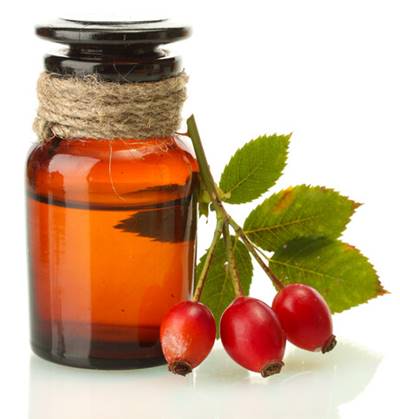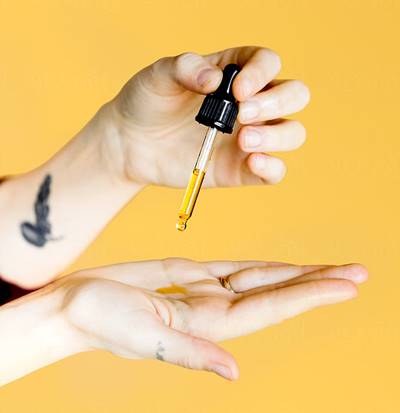One of the most debated topics among many individuals is whether oil and acne can go together. The common concern among them is if you are acne-prone can you still apply oils and if they are going to clog your pores.
One of the most sought oils in the past few years is rosehip oil, usually regarded as a miracle in a bottle. This article will explore the mystery of rosehip oil and if it’s living up to the hype.
Rosehip Oil

Rosehip oil is extracted from plants of the Rosaceae family. Usually called the rose oil, rosehip, rosehip seed oil, or rosehip. Rosehip oil is pressed from the seed and fruits of the rose plant. It is enriched with essential fatty acids and skin-nourishing vitamins.
The chemical composition of rosehip oil is given below:
- Alpha-linolenic acid (Omega-3): 16.6% to 26.5%
- Linoleic Acid (Omega 6): 35.9% to 54.8%
- Oleic Acid (Omega 9): 14.7% to 22.1%
The highest amount of fatty acid present in rosehip oil is linoleic acid. This is a lighter and thinner fatty acid as compared to the others like oleic acid. People with acne-prone skin lack the concentration of linoleic acid in their skin’s lipid composition, making it one of the reasons for having clogged pores and acne.
Rosehip oil is enriched with antioxidants, providing anti-inflammatory benefits, and protecting against environmental pollutants and oxidative stress.
Rosehip Oil is Non-Comedogenic
While selecting a skincare product to apply on your face, you would want to have a gentle and moisturizing product that won’t clog pores. Rosehip oil fulfills all of these requirements. Rosehip oil is a non-comedogenic oil, implying that it doesn’t clog pores.
Rosehip oil helps in regulating sebum production, preventing future breakouts by controlling the natural oils.
Treating and Avoiding Clogged Pores
To avoid clogged pores, you should use a mild cleansing face wash. You need to use a facial scrub or exfoliating mask on the affected areas. Moreover, you should look for the following ingredients in skincare products:
- AHA (alpha-hydroxy acids)
- Glycolic acid
- Salicylic acid
- Sulfur
- Pyruvic acid
- Lactic acid
Mild chemical peels are also effective in removing dead cells from the upper layer of skin, helping in maintaining sebum production.
Rosehip Oil and Its Effect on the Oily and Acne-Prone Skin
Rosehip oil is good for oily skin as it is non-comedogenic suggesting it is effective against pores and acne breakouts. As it regulates sebum production and antibacterial properties, it can work wonders on acne-prone skin.
Oily skin type can benefit from the rosehip oil properties as it absorbs quickly and moisturizes the skin without any greasiness. However, be mindful that it is occlusive and forms a barrier on the skin. So, in the case of sensitive skin, it may aggravate acne. Hence, be sure to check with your dermatologist first, before trying rosehip oil on your skin.
If you experience a breakout on your skin despite the non-comedogenic product like rosehip oil, you may want to use it with the combination of AHA and BHA products. While AHA removes debris and dead skin, Beta hydroxy acid like salicylic acid specifically fights off acne and breakouts.
Additional Benefits of Rosehip Oil
Rosehip has several advantages for the skin apart from preventing the clogging of pores. It can help in reducing the appearance of stretch marks, wrinkles, and dark spots. Owing to the anti-inflammatory properties of rosehip oil, it can heal wounds and reduce scars.
Some of the additional benefits of rosehip oil for your skin are listed below:
Fights off discoloration
It can help fight off the discoloration and dark spots, rosehip oil lightens with regular use. Due to the presence of Vitamins A and C, rosehip oil is effective by toning the skin color by minimizing inflammation and redness.
Rosehip oil is non-comedogenic
Rosehip oil is a lightweight product and prevents clogging of your pores.
Combats acne
Rosehip oil possesses antimicrobial and anti-inflammatory properties. The presence of Vitamin A, helps in regulating sebum production.
Reduce the acne scars
Vitamin A in rosehip oil is helpful in healing wounds and reducing inflammation, thus reducing the appearance of acne scars.
Moisturizing efffect
Rosehip oil is enriched with essential fatty acids, so, it creates a barrier on your skin by locking in the moisture and preventing dryness. Hence, it is ideal for dry or matured skin.
Anti-aging properties
The restorative vitamins, A and C, and the soothing Vitamin E in the rosehip oil reduce the wrinkles and fine lines from your skin. It supports collagen formation, thus making it an excellent anti-aging product.
Non-irritant
Rosehip oil does not include any harsh irritating ingredients or fragrances. It has a natural, faint earthly scent, slightly woody.
Antioxidant
Vitamin A and fatty acid also soothe the irritated skin caused by acne. Rosehip oil is high in antioxidants, which help in reducing inflammation and combatting free radicals, and preventing premature aging signs.
Application of Rosehip Oil to Your Skin

The most effective way to use it on your skin is by applying two or three drops on your palm and spreading it evenly on your entire face. Massage gently in a circular manner for at least a minute before going to bed. Make sure to use the evening moisturizer before using the rosehip oil. If you are applying it during the daytime, apply the SPF after using the rosehip on your face.
You can also add a couple of drops of rosehip oil to your moisturizer or serum to gain maximum results.
Conclusion
Rosehip oil has numerous benefits for the skin. It is a noncomedogenic, antimicrobial, anti-inflammatory product, suggesting it doesn’t clog pores. It contains lots of antioxidants that help in protecting, repairing, and soothing the skin. It also fights against the scars, wrinkles, and fines line as the richness of vitamins in the rosehip oil helps with the aging skin. Most importantly, rosehip oil is gentle enough for sensitive skin types as it does not include strong fragrance and irritating compounds.


